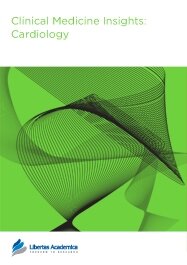

Publication Date: 23 Jan 2009
Journal: Clinical Medicine Insights: Cardiology
Citation: Clinical Medicine: Cardiology 2009:3 1-7

Objective: To determine whether the increase in plasma levels of C-Reactive Protein (CRP), a non-specifi c reactant in the acute-phase of systemic infl ammation, is associated with clinical severity of peripheral arterial disease (PAD).
Methods and Results: This is a cross-sectional study at a referral hospital center of institutional practice in Madrid, Spain. A stratifi ed random sampling was done over a population of 3370 patients with symptomatic PAD from the outpatient vascular laboratory database in 2007 in the order of their clinical severity: the first group of patients with mild chronological clinical severity who did not require surgical revascularization, the second group consisted of patients with moderate clinical severity who had only undergone only one surgical revascularization procedure and the third group consisted of patients who were severely affected and had undergone two or more surgical revascularization procedures of the lower extremities in different areas or needed late re-interventions. The Neyman affixation was used to calculate the sample size with a fixed relative error of 0.1. A homogeneity analysis between groups and a unifactorial analysis of comparison of medians for CRP was done. The groups were homogeneous for age, smoking status, Arterial Hypertension HTA, diabetes mellitus, dyslipemia, homocysteinemia and specific markers of inflammation. In the unifactorial analysis of multiple comparisons of medians according to Scheffé, it was observed that the median values of CRP plasma levels were increased in association with higher clinical severity of PAD (3.81 mg/L [2.14–5.48] vs. 8.33 [4.38–9.19] vs. 12.83 [9.5–14.16]; p 0.05) as a unique factor of tested ones.
Conclusion: Plasma levels of CRP are associated with not only the presence of atherosclerosis but also with its chronological clinical severity.
PDF (236.13 KB PDF FORMAT)
RIS citation (ENDNOTE, REFERENCE MANAGER, PROCITE, REFWORKS)
BibTex citation (BIBDESK, LATEX)
XML
PMC HTML

The review process in Libertas Academica journals is prompt, objective and rigorous. The entire process is smooth and clear and all the editorial staff are cooperative and professional. Published papers are of top clinical and scientific value, and high metrics reflect the excellent quality of Libertas Academica's journals.

All authors are surveyed after their articles are published. Authors are asked to rate their experience in a variety of areas, and their responses help us to monitor our performance. Presented here are their responses in some key areas. No 'poor' or 'very poor' responses were received; these are represented in the 'other' category.See Our Results
Copyright © 2014 Libertas Academica Ltd (except open access articles and accompanying metadata and supplementary files.)
Facebook Google+ Twitter
Pinterest Tumblr YouTube